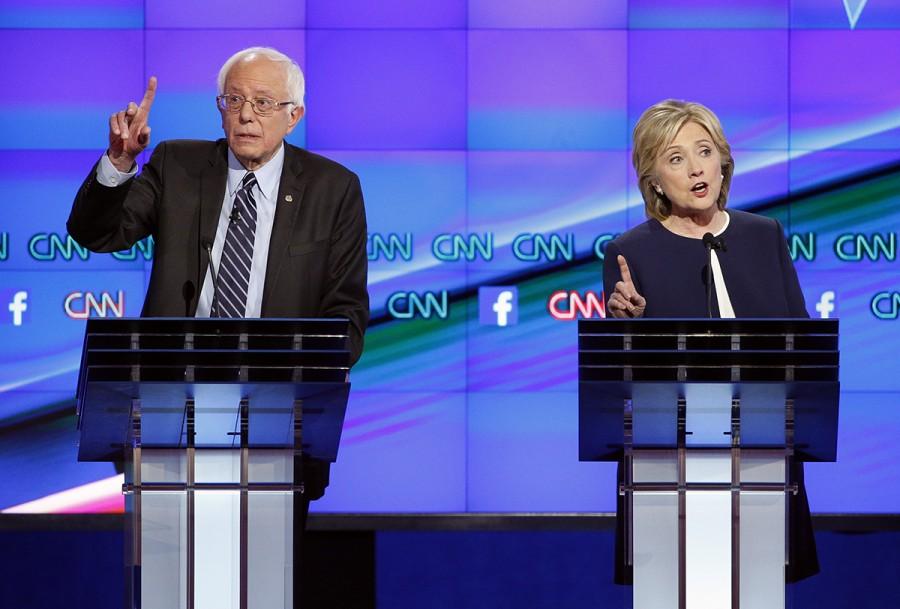Race tightens between Sanders and Clinton
Hillary Rodham Clinton, right, and Sen. Bernie Sanders, of Vermont, speak during the CNN Democratic presidential debate Tuesday, Oct. 13, 2015, in Las Vegas. (AP Photo/John Locher)
February 29, 2016
With the primaries well under way, many voters are evaluating the differences between candidates and deciding whose proposals to support. On February 1, the media-swarmed Iowa caucus showed just how close democratic candidates Bernie Sanders and Hillary Clinton are in the polls: Hillary led with 49.9% while Bernie trailed right behind at 49.6%.
While most young people identify as democrats, many of them are unaware of the differences between the two front-runners. Although Clinton and Sanders agree on many issues, they do have some distinct differences. Knowing the positions of each candidate can help millennials feel prepared before hitting the polls.
Both Bernie Sanders and Hillary Clinton have backgrounds in the political arena. Democratic Socialist Bernie Sanders studied at Brooklyn College and the University of Chicago. He has been a mayor of Vermont, served as Vermont’s representative in the House, and served as a Vermont Senator. Hillary Clinton studied at Wellesley College and Yale Law School, was the 42nd First Lady, served as U.S. Secretary of State, served as a New York Senator, and was a leading presidential candidate in 2008.
The two have taken different approaches when it comes to foreign entanglements. Regarding involvement overseas, Bernie Sanders generally believes that the United States should avoid foreign engagements. On the other hand, Hillary Clinton contends that foreign involvement can be necessary to protect the well-being of the United States.
In regards to defeating ISIS, Clinton does not support sending ground troops but does believe the United States should play a lead role in stopping the spread of terrorism. Contrary to Clinton, Sanders argues that Middle Eastern countries, rather than the U.S., should have the primary responsibility due to their proximity.
With the civil war going on in Syria, Hillary Clinton supports a no-fly zone while Bernie Sanders opposes the idea. Sanders called it a “secondary issue,” claiming that ISIS is the principal issue. The two politicians have both opposed the deployment of ground troops.
In Afghanistan, Hillary Clinton believes that it may be necessary to maintain some troops to aid the country’s stability and prevent the cultivation of terrorism, while Bernie Sanders calls for the withdrawal of troops for their safety.
Domestic issues have also been discussed by the Democratic front-runners. On the legalization of marijuana, Bernie Sanders supports its legalization. Hillary Clinton believes the sentencing should be reduced, but ultimately does not believe in the drug’s legalization.
Regarding capital punishment, Bernie Sanders thinks that government should not be responsible for killing. Unlike Sanders, Hillary Clinton believes the death penalty should be utilized for the most heinous crimes with exceptional evidence.
In addition, the two leading candidates have also differed on the issue of gun control. While democratic candidates Lincoln Chafee, Martin O’Malley, and Hillary Clinton all received an “F” rating from the National Rifle Association, Bernie Sanders received a slightly better “D-” rating. Clinton believes gun violence victims should be able to sue weapon manufacturers and sellers who violate the law, while Bernie Sanders does not believe these organizations should be liable. In fact, Bernie Sanders voted against the 1993 Brady Bill five times, which called for a five-day waiting period and federal background checks on firearms. Clinton, on the other hand, supported the bill and it eventually passed.
Furthermore, Bernie Sanders aspires to make all public colleges tuition-free by taxing Wall Street, while Hillary Clinton wants to give states $17.5 billion to improve and encourage higher education. Although Clinton has not endorsed free public college, she supports lowering interest rates on loans and free community college.
The minimum wage has also been a hard-pressing issue for many Americans. Bernie Sanders wants the minimum wage increased to $15 an hour, while Hillary Clinton advocates for $12 an hour.
Moreover, the Affordable Care Act of 2010 has left many U.S. citizens debating over its effectiveness. On the issue of health care, Hillary Clinton believes in expanding upon the Affordable Care Act and making health care accessible to all Americans. Bernie Sanders claims that the act is insufficient, and thinks a single-payer system is the best route.
While the two have debated on an abundance of issues, they are very alike on the importance of LGBT rights, women’s reproductive rights, the need to combat global warming, fighting sexual assault on college campuses, reforming the campaign finance system, a path to citizenship for immigrants, and lifting up the middle class.
In all, Bernie Sanders and Hillary Clinton differ substantially when it comes to many key issues. While Bernie Sanders calls for a political revolution and presents many socialist ideas, Hillary Clinton remains a progressive democrat with experienced ideas. With the Illinois primary rapidly approaching on March 15, it’s almost time for young voters to take a stance and cast their ballot with confidence.
For more information on the candidates, visit their websites at BernieSanders.com and HillaryClinton.com.


